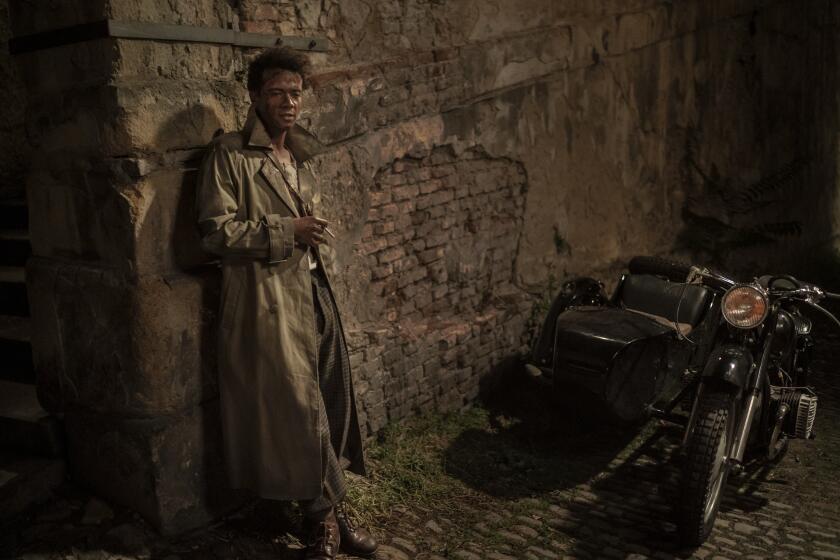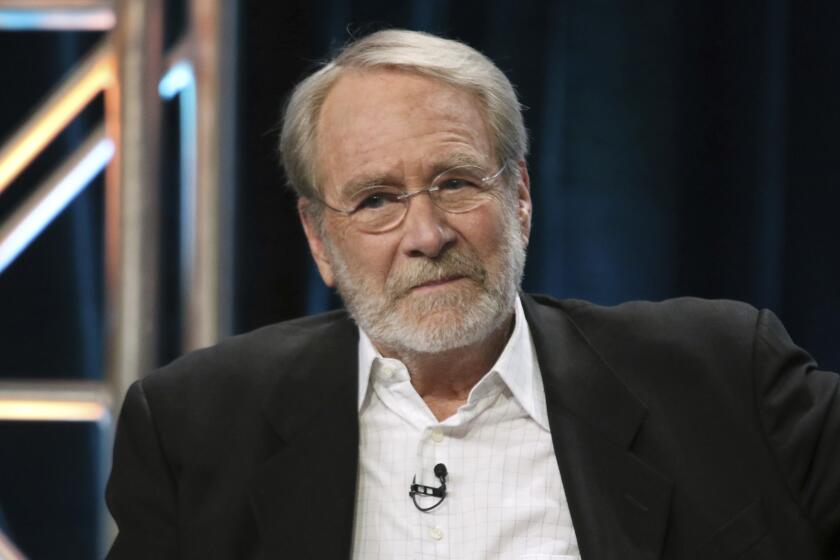Indie Focus: ‘The Color Wheel’ finally rolls into theaters
The Sundance Film Festival rejected it. So too did South by Southwest and New Directors/New Films. But “The Color Wheel,” the second feature from Alex Ross Perry, is finding its own life on the art house circuit as a celebrated upstart thanks to critical support and a new nonprofit organization, Cinema Conservancy, which is releasing the black-and-white indie comedy in more than 20 cities.
“I don’t know if I knew a year and a half ago that there was a trajectory like the one I have now taken,” Perry, 27, said, speaking by phone from his Brooklyn apartment, of the film’s unlikely change of fortune.
Opening in Los Angeles on Friday, “The Color Wheel” follows a pair of estranged siblings thrown back together when J.R. (co-writer Carlen Altman) asks her brother Colin (Perry) to help her move out of the apartment she had been sharing with a professor with whom she had been having an ill-advised affair. As the pair bickers and banters through the weekend, it becomes apparent that her self-delusion and his self-defeatism are flip sides of the same coin.
Originally from Bryn Mawr, Pa., Perry moved to New York to study film production at New York University, also landing a job at Kim’s Video, the store renowned for its extensive catalog of obscure titles. His 2009 debut feature, “Impolex,” was a riff on the head-spinning worldview of author Thomas Pynchon that established him as a promising talent to watch — Variety described “Impolex” as “a madly uncommercial head-scratcher” notable for its “provocative absurdity.”
“The Color Wheel,” which Perry directed, co-wrote, edited and produced, functions in a similarly heady way. The film is not an adaptation of a specific work by novelist Philip Roth but, rather, an interpolation of the neurotic anxieties and deep-rooted frustrations examined in Roth’s work. More important, Perry says he set out to turn the indie mainstay of the dysfunctional family road trip on its ear; “Color Wheel” transforms into an abrasive, boundary-crossing anti-romantic comedy.
“I want people to look at it and feel that’s what they’re watching, so they’re comfortable,” Perry said of “Color Wheel’s” sly genre pastiche. “The more comfortable we make them feel, the funnier the betrayal will be when it comes and slaps them in the face. And the more satisfying for me to have orchestrated successfully building this film as something I kind of hate only to completely burn it to the ground, maliciously and with utter contempt and lack of regard for the audience.”
Perry’s rumpled confidence and brash attitude factored into his decision to cast himself as Colin. That move puts him in line with his acknowledged creative influences, Jerry Lewis and Vincent Gallo, filmmakers whose comedic screen personas are infused with an undercurrent of aggression.
“There was just no other way,” he said. “It wasn’t like I looked for people and couldn’t find them. You write something and say, ‘You know what would be perfect for this?’ And on this script that person was me. And the other me was like, ‘I don’t want to do that.’ But the director was like, ‘There are reasons you have to do this, and I’d appreciate it if you did.’ And I couldn’t argue with myself.”
As with “Impolex,” Perry self-financed “The Color Wheel” through family and friends, allowing that “it cost more than a Honda and less than a Lexus.” Shot on 16-millimeter film in three weeks across four states (New York, Vermont, Massachusetts and Pennsylvania), the ambitious adventure took its toll on cast and crew, which only fed the on-screen antagonism between Altman and Perry.
“I guess we did drive each other crazy,” Altman, 28, told The Times last year when asked to describe her experience during the shoot, “in that we were just really anxious about getting it done. It did kind of feel like he was becoming my brother during the process. It felt like a bickering relationship, but it was a means to an end. I accepted that the process was kind of stressful.”
Olivier Père, artistic director of the Locarno International Film Festival, where “The Color Wheel” had its international premiere, in an email called the film “the strongest thing to have appeared on the landscape of young American filmmaking for a number of years.”
Still, those initial rejections nearly derailed the film’s launch, with early responses criticizing the comedy’s rough-around-the-edges look and labeling its central siblings annoying. Yet once “Color Wheel” started playing festivals, including L.A.’s AFI Film Fest, it began to amass a following, finally gathering enough momentum to top two separate year-end critics’ polls for best undistributed film. In the New York Times, critic A.O. Scott recently described it as “infuriating but never boring,” while in the New Yorker, Richard Brody declared the film “bracingly original.”
Earlier this year Cinema Conservancy stepped forward to distribute the film to theaters in cities including New York, San Francisco and Portland, Ore., and less likely venues in Portland, Maine; Ogden, Utah; and Tucson.
Although Perry’s certainly pleased that the film now has the chance to reach a wider audience, he was always aware that “The Color Wheel” could rub plenty of people the wrong way.
“I was definitely realistic about it,” Perry said. “I wasn’t like, ‘Here comes a crowd-pleasing feel-good comedy.’ I was very realistic about it and very aware of the movie we were making and very comfortable with presenting something that was confrontational in a way that was unusual to people and irritating in a way that’s unusual to people and kind of forces you to get a little more up in arms about what you’re watching. Why not?”
Perry’s planned next project is called “Listen Up Philip,” which draws inspiration from writers William Gaddis, Richard Yates and Jonathan Franzen. It’s a story about someone who moves to the city only to be confronted by a world of “New York artistic types, phonies and deceitful hangers-on.”
If that sounds like it might be familiar terrain for someone who moved to New York City to be a filmmaker, Perry added, “The script has a lot of things that are wish fulfillment in one way or another, either of success that hasn’t happened or revenge that hasn’t happened. There isn’t a lot in it that I’ve actually gone through but more things that I could or perhaps am afraid that I will.”
More to Read
The biggest entertainment stories
Get our big stories about Hollywood, film, television, music, arts, culture and more right in your inbox as soon as they publish.
You may occasionally receive promotional content from the Los Angeles Times.







